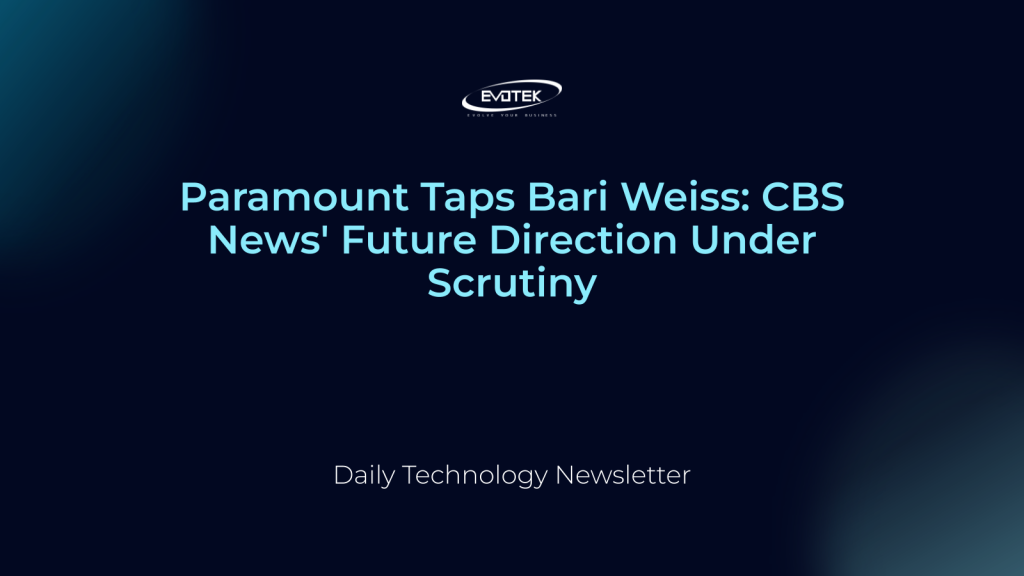A curious paradox continues to unfold within the U.S. media landscape: those who most vocally lament being “cancelled” or having their “conservative viewpoints silenced” are increasingly acquiring significant stakes in major American media outlets. This trend often raises questions about whether such claims of marginalization are, in fact, strategic maneuvers to dominate public discourse, rather than genuine expressions of censorship.
In a move anticipated by many, the Ellison family, owners of Paramount/CBS, has officially announced the appointment of Bari Weiss, a polarizing figure often described as a “contrarian” engagement specialist, to a key role at CBS News. This decision comes in the wake of CBS News’s controversial editorial shifts during the Trump administration. The acquisition, reportedly including Weiss’s online publication for a substantial $150 million, is part of a broader, aggressive media acquisition strategy by the Ellison family, aimed at reshaping the remaining U.S. media outlets.
David Ellison, the Paramount CEO and son of billionaire Larry Ellison, a prominent ally of former President Trump, circulated an internal memo attempting to frame Weiss’s hiring as a commitment to fostering a new era of “rigorous, fact-based reporting” and “a relentless commitment to amplifying voices from all corners of the spectrum” at the long-standing media institution. Critics, however, argue these principles stand in stark contrast to Weiss’s documented professional history.
This considerable financial investment in Weiss coincides with plans for significant layoffs across CBS News, impacting numerous journalists and editors. These impending job cuts are reportedly intended to alleviate the substantial debt accrued through these high-profile acquisitions.
The Ellisons’ aggressive media acquisition spree appears to be driven by a clear objective: to transform the fragmented U.S. media into a blend of right-wing commentary and corporate-aligned infotainment. This strategy mirrors attempts observed elsewhere, such as the changes at Twitter under its new ownership, signaling a broader intent to engage in what some characterize as “information warfare.” The subtlety of this campaign is often debated, yet its impact on the press’s ability to contextualize these shifts for the public remains a significant concern.
For those familiar with Weiss’s career trajectory, Ellison’s memo, filled with aspirational rhetoric, may appear particularly ironic. From her tenure at the New York Times to her independent venture, The Free Press, Weiss’s approach has often been described as leveraging “culture war” controversies to generate engagement. Her method frequently involves criticizing left-leaning perspectives to attract clicks, often followed by accusations of being “silenced” when her work faces scrutiny.
Many observers view Weiss’s prominent role as part of a larger initiative by certain elite factions to reposition mainstream media toward the right. This shift is often justified as a necessary “anti-woke” correction to what they perceive as a liberal bias, a bias often disputed by others. This strategy frequently targets academics, progressive advocates, and marginalized communities – voices that some affluent, center-right individuals appear to see as a greater threat to their influence and wealth than potential authoritarian tendencies.
Concerns have also been raised regarding Weiss’s suitability to lead a major newsroom. Her previous experience as a junior editor and opinion writer at the New York Times has led some journalists to view her ascension with dismay. Her past output, and that of her current platform, has drawn criticism for what some describe as shoddy reporting and the promotion of dangerous falsehoods. For many, Weiss’s appointment seems counterintuitive to the goals of fostering objective journalism, genuine ideological diversity, or de-escalating the intensity of public discourse.
The impact of this decision on CBS News staff is palpable. Employees, particularly those who have remained through previous controversial editorial decisions, are reportedly “freaking out” over the imminent arrival of Weiss. Sources cited by The Independent describe a palpable sense of unease within the newsroom, indicating that “the Tiffany Network is not a good place right now.”
Adding to the uncertainty, skepticism exists about the new leadership’s operational competence. Critics suggest that David Ellison, whose rise to media ownership is often attributed to nepotism, and Weiss, labeled a “contrarian” and a controversial figure, may lack the practical experience to run a complex news organization effectively. While The Free Press does publish some investigative pieces, a significant portion of its content is punditry, and Weiss herself is not primarily known as a reporter. An example often cited is a recent Free Press article on an AI “actress” that included an author’s note about the figure being a good option “if you wish to see a virgin on-screen,” which some found editorially questionable.
Larry Ellison’s broader ambitions reportedly include expanding his media empire to encompass entities like Time Warner, CBS, and potentially even TikTok, with the aim of creating a modern media conglomerate akin to Fox News. This vision, which seeks to vigorously challenge narratives deemed unfavorable to the world’s wealthiest, is often presented as a commitment to free speech and journalistic integrity. However, this trend of ideological influence is observable across numerous U.S. corporate media organizations, including the New York Times, Washington Post, and CNN.
Historically, such expansive media consolidation plays have faced significant challenges. The media industry is notoriously unforgiving, even for highly competent players. Furthermore, the market for ideologically driven content, particularly that aligned with conservative billionaires, is already quite saturated. Nevertheless, figures like Ellison, much like Elon Musk, appear willing to sustain substantial financial losses if they believe it advances their ideological battles against concepts like equity, democracy, and informed consensus. For those driving this rightward shift in U.S. media, the pursuit of fairness, genuine opinion diversity, and rigorous journalism often takes a backseat to ideological objectives, with financial considerations seemingly secondary.

 日本語
日本語 한국어
한국어 Tiếng Việt
Tiếng Việt 简体中文
简体中文